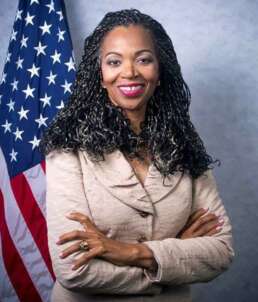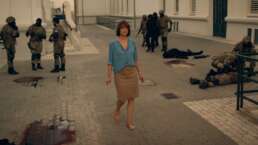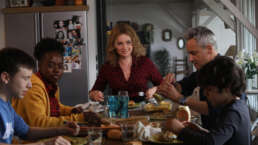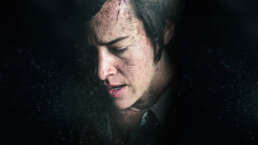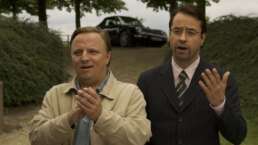Now Streaming: The Diplomat
The harrowing second episode of The Diplomat begins with Karla Lorenz overseeing a routine security exercise at a German embassy in Tunis. It turns deadly when one of her staff, a radicalized German citizen, opens up the embassy to terrorists.
For US Ambassador Gina Abercrombie-Winstanley (ret), the episode was realistic, and she was kind enough to share her response with MHz Choice.
Of all possible viewers, she would have an informed opinion: Abercrombie-Winstanley was the longest serving ambassador to the Republic of Malta, played a key role as the Secretary of State’s Special Assistant for the Middle East and Africa, and was the first woman to lead a diplomatic mission to the Kingdom of Saudi Arabia. She was Chief of Mission at the US Consulate General in Jeddah when gunmen entered the compound. For background, these two articles here and here summarize the event in Saudi Arabia.
Ambassador Abercrombie-Winstanley – Terrorists did enter the consulate when I was Chief of Mission and in addition to killing a staff member almost immediately, held several of our local staff hostage until the Saudi National Guard could effect a rescue. And we lost five members of staff during that attack. So that hostage situation in the episode; the breaching of a diplomatic mission is one that struck home very forcefully.
MHz Choice: You must have resonated with the character of Karla in terms of the trauma and grief she experiences.
Ambassador Abercrombie-Winstanley: Yes. And the fact that they were doing a crisis management simulation and involving the local police force is very real. That’s exactly what happens around the world. So they got that right. I think they did very well at communicating the shock that one feels when you realize this is no longer a drill.
MHz Choice: What was that morning in 2004 like for you?
Ambassador Abercrombie-Winstanley – I was in my office that morning talking to the embassy, and heard shots outside the window. I assumed the shots were on the street. I got off the phone. I said to my colleague, “I hear shots and let me find out what’s going on.” I was starting to get up from my chair when my security chief came in and said, “CG, get down! And get into your safe haven,” which was a secure room with no windows. Then he determined that I needed to move from there to a larger space that was a safe haven for that side of the consulate. Eventually they brought as many consulate employees as possible to that space.
I remember spending the morning without my shoes. As many women do, I’d slipped my heels off under my desk. I did not take the time to get them back on before I had to run out of the office
MHz Choice: How long was the group kept in the safe place?
Ambassador Abercrombie-Winstanley – We were there from about 11:00 am until 3:00 in the afternoon. When I came back to my office, there were bullets in the window. When my political officer got back to her office, they had attacked her windows and shot up her computer. So it was clear, though they didn’t enter the building, the offices where we were working were not safe places to be.
MHz Choice: In the episode, there was a betrayal by a staff member that led to the attack. Did your situation involve a similar betrayal?
Ambassador Abercrombie-Winstanley: No, they had been surveilling us and figured out a way to circumvent some of our security measures.
MHz Choice: In the days after an event like this, how do you get past it?
Ambassador Abercrombie-Winstanley: We all carried on, local hires and Americans both. We had to rebuild the consulate and our community afterwards, which was a lengthy and difficult challenge. But as a representative of the United States, as diplomats, as public servants, we were there to represent US interests and maintain that bilateral relationship and we all carried on. The reality is that being a diplomat, like being in the military, is dangerous business. But we’re public servants and do the best we can to take the precautions to protect ourselves and our mission. We’re there to represent the American people.
MHz Choice: The psychological strength to do this work must be similar to career soldiers. Did you have friends who were killed like the German ambassador was killed in the second episode?
Ambassador Abercrombie-Winstanley: In addition to the friends and colleagues list in Jeddah, yes, the US Ambassador to Libya, Chris Stevens, was someone I knew well and in fact, we were waiting for our confirmation hearings at the same time. He was confirmed by the Senate a week after I was. So after we both got confirmed, we did high-fives and congratulated each other over making it through a rather arduous process. I also lost friends and colleagues in the bombings of our Embassies in Kenya and Tanzania, so, yes I knew people who did not make it.
MHz Choice: This work requires such steely commitment.
Ambassador Abercrombie-Winstanley – You know, it is such a privilege to represent the United States of America. It’s something that I woke up feeling every single day. Privileged and humble. If you use your training you’ll have the tools to navigate these very difficult circumstances. And frankly, like my colleagues all over the world, I’ve had many in my career. This is just one of the many things that happened when I was a diplomat. It is a remarkable life.
MHz Choice: Ambassador, thank you for your service. And thank you for speaking with us.
Ambassador Abercrombie-Winstanley: My pleasure.
Want to get MHz Choice Premiere announcements sent to your inbox?
Sign up for our free newsletter here!
MHz Choice is available in the U.S. & Canada. Free 7-day trial then $7.99/mo.
Subscribe at mhzchoice.com.


